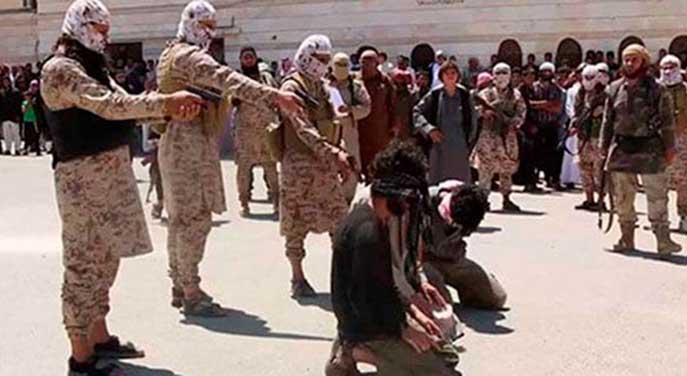 Extremism thrives in chaos. Since the Arab Spring plunged Syria into civil war, the country has been consumed by factionalism.
Extremism thrives in chaos. Since the Arab Spring plunged Syria into civil war, the country has been consumed by factionalism.
For example, the northwest of the country is controlled by the Syrian National Army (which includes an Al-Qaeda faction), and the northeast is controlled by the U.S.-backed Syrian Democratic Forces (SDF).
Syria’s political landscape is complex. For instance, many of those who fight for the U.S.-backed SDF are Kurds, whom Turkey considers terrorists. Thus, the U.S. and Turkey, NATO allies, frame the SDF differently.
At the end of 2018, SDF soldiers – an ally of the U.S. – engaged Turkish troops – another U.S. ally.
Our multipolar, conflict-ridden world produces surprising alliances. In Iraq in 2014, Iran and the U.S. – in other contexts, enemies – battled Daesh, which is also known as the Islamic State.
Since Russia invaded Ukraine in 2022, the U.S. has provided significant amounts of war material to Kyiv, including the devastating HIMARS guided artillery bombardment system. Putin has accused the U.S. of fighting a proxy war against Russia. Relations between the two superpowers are poor.
 |
| Related Stories |
| How the world lulled itself into a false sense of security
|
| Facing up to the harsh truth about the Islamic State
|
| Canada must designate Iran’s Revolutionary Guard a terrorist group |
Concurrent with the Russia-Ukraine War, both Russia and the U.S. have boots on the ground in Syria, with Russia supporting the Assad regime and the U.S. supporting anti-Assad forces. The U.S. maintains two bases in-country, from which it can deploy troops and armour. There is thus a potential for open warfare on Syria’s dusty plains between Russian and U.S. forces.
Daesh exploits chaos. The group’s leaders have called on supporters to plan and execute attacks under cover of the uncertainty and disruption caused by the Russia-Ukraine War. In Syria, they have seen the country’s factionalism and superpower stand-off as an opportunity to regroup and reassert.
Daesh evangelizes a brutal variety of political Islam that subjugates women, vilifies Jews, persecutes homosexuals, demonizes all non-Muslims and denies freedom of thought, speech and expression. In 2014, Daesh filmed the murders of journalist Steven Sotloff and aid workers David Haines and Alan Henning.
The group’s ideology is mindless and cruel, a product of bigotry, intolerance and wilful ignorance – the kind of medieval thinking that motivated the recent attack on Salman Rushdie, Mao’s Cultural Revolution that incited mindless violence against talented people and the Khmer Rouge’s Year Zero genocide of two million Cambodians (see journalist John Pilger’s award-winning documentary: Year Zero: the silent death of Cambodia).
By circulating films of ultraviolence, Daesh believed it could cow the Free World. How wrong it was. At its apogee, the group’s so-called Caliphate controlled approximately 40 percent of Iraqi territory and 30 percent of Syrian territory. Alarmed by the group’s success, the U.S. launched Operation Inherent Resolve, an anti-Daesh coalition.
By the end of 2017, Daesh, having surrendered Mosul and Raqqa, was in retreat and Western leaders considered the reversal proof that Daesh was finished. In December 2017, Iraqi Prime Minister Haider al Abadi claimed Daesh had been defeated in Iraq. In December 2018, then U.S. President Donald Trump claimed Daesh had been defeated in Syria and signalled his intention to withdraw U.S. troops.
Trump’s claim, perhaps intended to capitalize on isolationist sentiments at home, ignored the fact that Daesh was adept at rebounding. Following the 2007 U.S. ‘surge’ in Iraq, Daesh disintegrated. Just two years later, Daesh was recruiting. Given the group’s obvious resilience, it is pertinent to ask why Trump claimed Daesh was finished. Explanations include:
- that he was simply ignorant of the historical record (by all accounts, Trump is not an intellectual and is not especially well-read)
- that he was familiar with the historical record but decided, in the context of his America First polemic, to focus on domestic rather than international politics
- that, in the same way that politicians saw political advantage in cultivating the post-Cold War Peace Dividend narrative (a profoundly flawed discourse that blinded the Free World to Russia’s inexorable descent into totalitarianism), Trump saw political advantage in cultivating the narrative that Operation Inherent Resolve had delivered a durable peace. There is political capital in claiming victory over an enemy, especially one as morally repugnant to the American people as Daesh.
Is Daesh a spent force? In January 2022, hundreds of Daesh fighters attacked a prison in northeast Syria. They were repelled, but not until SDF soldiers and prison guards were killed and prisoners released. Daesh was back.
What lessons are there in this shocking episode? First, actively learn. History tells us that Daesh is resilient. Second, denialism, disengagement, retreat and appeasement deliver nothing but death. The best way to protect your people at home is to engage your enemies abroad and, if necessary, neutralize them.
Dr. Simon Bennett directs the Civil Safety and Security Unit at the University of Leicester. He’s interested in the organizational, social, economic and political origins of risk. He has worked with the Royal Air Force and U.K. National Police Air Service on human-factors issues. His latest book, Safety in Aviation and Astronautics: A Socio-technical Approach, was published by Routledge in 2022.
For interview requests, click here.
The opinions expressed by our columnists and contributors are theirs alone and do not inherently or expressly reflect the views of our publication.
© Troy Media
Troy Media is an editorial content provider to media outlets and its own hosted community news outlets across Canada.

